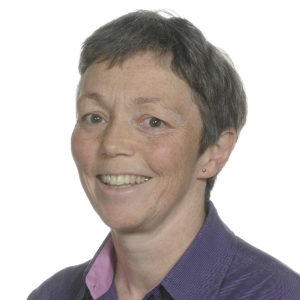
Prof. Emma Baker, professor of clinical pharmacology, St George’s Hospital, University of London
What do you do? and what is a typical week for you?
I spend half my time on university work and half my time on NHS work. In the University I am lead for prescribing education for medical students, designing and delivering lectures and workshops and assessing their prescribing skills. I run a research programme investigating disease mechanisms and new treatment approaches in chronic respiratory disease and multimorbidity. I am principal investigator for my institution for clinical trials registered on the study portfolio of the UK comprehensive research network. In the NHS I see hospital inpatients and outpatients with general medical conditions, with a particular focus on respiratory disease. I chair our formulary committee, which oversees the adoption of new medicines by our hospital, and have recently been appointed as a member of the regional medicines optimisation committee, looking at better use of medicines in the NHS.
Externally, I am a trustee of the British Pharmacological Society (BPS) and on the clinical, education and meetings committees. I consider the area where I can most usefully contribute to the BPS to be to the campaign to promote the role of clinical pharmacologists in the NHS.
In a typical week I write grant applications and research papers, supervise PhD and undergraduate project students, give lectures and tutorials, attend meetings, plan new projects and see patients in the clinic or on the wards. Administration and emails will take up a lot of time if I let them so I try to keep these under control.
What qualifications and experience do you have?
I qualified as a medical doctor and worked for 4 years as a junior doctor in the NHS. I then took 3 years out of the NHS to do a PhD in molecular biology, before coming back into medicine as a lecturer in hypertension. From there I was appointed as senior registrar in clinical pharmacology and general internal medicine, working jointly for the university and the NHS. My first substantive post was as a university senior lecturer in clinical pharmacology, later being promoted to reader, then professor. Throughout this time I have held an honorary NHS contract.
What’s the most interesting aspect of your job?
I love the variety of the job; no two days are the same. The pharmacology is fascinating both in its own right and in the clinical context. I love being involved in the wider pharmacology community and in developing and promoting pharmacology for the future.
What are your research interests?
My main research interests are in Chronic Obstructive Pulmonary Disease (COPD). I conduct experimental medicine studies and investigator-led clinical trials relating to COPD exacerbations and co-morbidity. In the next phase of my career I am moving back to make more of a contribution to the NHS as a clinical pharmacologist. I hope this will contribute to the wider effort to generate culture change and realise the potential of our specialty in ‘making sure that patients get the best medicines’.
What one piece of advice would you give to someone seeking a career in clinical pharmacology?
Embrace all opportunities to develop your expertise in clinical pharmacology – through clinical practice, research and teaching. Become a member of the British Pharmacological Society and engage with the pharmacology community and its networks. Be brave, be a clinical pharmacologist. ‘Insurance policies’ such as a third specialty take up a lot of energy and make it difficult for us to demonstrate the benefit of our specialty to the full, thus impeding its development